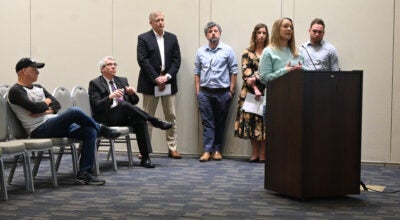City calls off annexation plans
Published 12:00 am Wednesday, December 2, 2009
By Mark Wineka
Salisbury Post
Just like that, it was over.
Salisbury City Council voted Tuesday to stop its annexation attempt of the N.C. 150 area.
The decision came mostly for financial reasons.
“This is not a good business deal for the city of Salisbury,” City Manager David Treme said before the council’s unanimous vote, which caught opponents by surprise.
Residents from the eight subdivisions along N.C. 150 and elsewhere had purposely flooded City Hall with 659 individual request forms for water-sewer service by Monday’s 5 p.m. deadline.
It was a strategy discussed weeks ago by opponents, who formed the Good Neighbors of Rowan County group to fight the involuntary annexation. An estimated 1,699 people were tabbed to be brought into the city limits June 30.
The Good Neighbors aimed to raise $100,000 for a legal challenge to the annexation. Residents also held protests on the Square, took two busloads to Raleigh to speak to a House Select Committee on Municipal Annexation, distributed newsletters and had strong attendance at two city meetings.
This past weekend, neighborhood leaders went door to door in the annexation area to have people fill out the water-sewer requests forms and collect them for delivery.
The annexation area had some 948 parcels, of which 732 were single-family homes. So the percentage of people filling out the forms was strong, far above the 38 connections the city had judged it would have to make by only extending major trunk lines.
Running water and sewer to individual properties in the entire annexation area ó essentially what all the submitted forms taken collectively were asking ó would have cost the city $30 million to $34 million.
City officials realized quickly they were hamstrung by their own current policies.
Salisbury does not require mandatory hookup to water and sewer services, even if the lines run by a person’s property.
The submitted forms were a “survey” and did not obligate property owners requesting the utilities to take them.
Salisbury would have been running service lines throughout the whole annexation area with no guarantee that it would have any customers ó definitely not enough to pay for the huge utility expansion.
Treme said it was “just not economically feasible,” especially with a policy in place that does not require mandatory hookup.
Also, Salisbury could not change its policy in the middle of the annexation process.
Given discussions with people in the area, Treme added, it was estimated that only 20 percent of the potential customers actually would take water-sewer services. Others would stay with their existing wells and septic tanks.
“Our final report shows the cost of this annexation to be prohibitive for the near future and would require us to use existing citizens’ tax dollars to make this happen,” Councilman Mark Lewis said.
“… Sure, 30 years from now this might have made sense, but from a financial point of view, it doesn’t right now.”
Lewis also had other reservations with the annexation proposal and made them in a compelling speech before the vote. (See the accompanying story.)
“Frankly, I still support annexation,” Councilman Bill Burgin said. As growth comes up Interstate 85 toward southern Rowan County and Salisbury, if municipalities don’t have annexation as a tool, they will be crushed by the growth, he said.
Burgin said people live in the proximity of the city for that reason ó to be close to the city ó and they must share some of the burden on its infrastructure.
The problem with annexation is that it’s almost always a win-lose situation, Burgin said. Either a city gains most of the benefits or an annexation area does. But if the process reveals a lose-lose situation, he can’t support it, Burgin said.
“I think we have to indeed stop a process that is lose-lose,” he added of this particular annexation.
Burgin said he disagreed with opponents in that he thinks forced annexation is taxation with representation, not without. He said the representation comes from the General Assembly, where the annexation law was approved 50 years ago.
Mayor Susan Kluttz said she still thought annexation is an important tool for a municipality’s growth, and she reminded the audience Tuesday that she had said throughout the city was looking at the proposal within the framework of the state law.
“This is a process we have followed,” she said.
It turns out, based on Treme’s report Tuesday, that the annexation would not benefit Salisbury, Kluttz said.
“I agree fully, this is not advantageous to y’all or us in the city,” Mayor Pro Tem Paul Woodson said, addressing a few of the annexation opponents in the audience.
Woodson said he was impressed at how well organized the opponents were, but he also credited council members for looking objectively at the annexation.
“I think the democratic process does work,” Woodson said. “… We do listen as council people.”
During his eight terms on the council, Councilman William “Pete” Kennedy said, he always has tried to wait for all the information on an issue. Based on what he heard Tuesday, the annexation process should stop, he said.
“This just doesn’t make sense for us,” Kennedy added.
Larry Wright, a vocal opponent to he annexation, said he tore up the remarks he was set to deliver at the council’s public comment period Tuesday.
He said he was one of the people who thought the annexation was “a done deal up front” and also one of the people who thought the council wasn’t listening as 91 different people spoke to them at last week’s public hearing.
“I thank you for listening and the vote you gave today,” Wright told the council members.
Wayne Remes also shelved the comments he planned to make and told council members they were not “the face of evil incarnate” he had imagined.
Bill Owens of Glen Heather said he thinks forced annexation is still taxation without representation, but he added, “I think it’s time to heal.”
“What matters is we do things together,” Harry Rivera of Summerfield said. “The bickering needs to stop.”
The council’s decision means it’s the second time in nine years that the residents along N.C. 150 have successfully turned back a Salisbury annexation.
Rowan County Commissioner Tina Hall, who attended the meeting, thanked the council for its vote and reiterated the county’s position that the annexation was a bad deal for Salisbury citizens and those in the annexation area.
She said the 1959 state law which allows cities to annex property owners involuntarily is on thin ice and that citizens are against it statewide.
Commissioners want the local legislative delegation to introduce a bill placing a moratorium on all annexations in Rowan County. Commissioners also had hired an Asheville law firm to oppose the annexation, because it included the rest of the Rowan County Airport and meant the loss of roughly $240,000 in sales tax revenues.
Hall noted that the city and county leaders had completely different outlooks on the issue, but she said she looked forward to working with the council in the future.
“Hopefully, it will be a two-way street this time,” she said.
Contact Mark Wineka at 704-797-4263 or mwineka@salisburypost.com.





